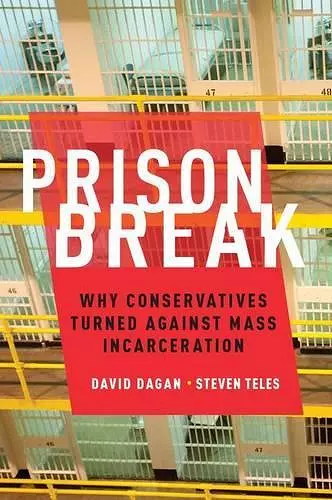Prison Break
Why Conservatives Turned Against Mass Incarceration
Steven Teles author David Dagan author
Format:Hardback
Publisher:Oxford University Press Inc
Published:4th Aug '16
Currently unavailable, and unfortunately no date known when it will be back

American conservatism rose hand-in-hand with the growth of mass incarceration. For decades, conservatives deployed "tough on crime" rhetoric to attack liberals as out-of-touch elitists who coddled criminals while the nation spiraled toward disorder. As a result, conservatives have been the motive force in building our vast prison system. Indeed, expanding the number of Americans under lock and key was long a point of pride for politicians on the right - even as the U.S. prison population eclipsed international records. Over the last few years, conservatives in Washington, D.C. and in bright-red states like Georgia and Texas, have reversed course, and are now leading the charge to curb prison growth. In Prison Break, David Dagan and Steve Teles explain how this striking turn of events occurred, how it will affect mass incarceration, and what it teaches us about achieving policy breakthroughs in our polarized age. Combining insights from law, sociology, and political science, Teles and Dagan will offer the first comprehensive account of this major political shift. In a challenge to the conventional wisdom, they argue that the fiscal pressures brought on by recession are only a small part of the explanation for the conservatives' shift, over-shadowed by Republicans' increasing anti-statism, the waning efficacy of "tough on crime" politics and the increasing engagement of evangelicals. These forces set the stage for a small cadre of conservative leaders to reframe criminal justice in terms of redeeming wayward souls and rolling back government. These developments have created the potential to significantly reduce mass incarceration, but only if reformers on both the right and the left play their cards right. As Dagan and Teles stress, there is also a broader lesson in this story about the conditions for cross-party cooperation in our polarized age. Partisan identity, they argue, generally precedes position-taking, and policy breakthroughs are unlikely to come by "reaching across the aisle," promoting "compromise," or appealing to "expert opinion." Instead, change happens when political movements redefine their own orthodoxies for their own reasons. As Dagan and Teles show, outsiders can assist in this process - and they played a crucial role in the case of criminal justice - but they cannot manufacture it. This book will not only reshape our understanding of conservatism and American penal policy, but also force us to reconsider the drivers of policy innovation in the context of American politics.
With academic rigor and literary verve, in this excellent and timely book, Dagan and Teles insightfully describe, analyze, and assess the conservative trek from a consensus on get-tough crime policies to a coalition favoring expansive justice system reforms." * John J. DiIulio, Jr., Frederic Fox Leadership Professor, University of Pennsylvania, former Director, White House Office of Faith-Based and Community Initiatives *
With clarity, concision, and an astute understanding of what makes politics tick, David Dagan and Steven Teles peer inside the black box of social change and show how a handful of strange bedfellows catalyzed seemingly impossible reforms-and how it might happen again. Cynics, beware: Prison Break will restore your faith that, with a lot of smarts and a little luck, American politics can still deliver." * Jonathan Rauch, Senior Fellow, Brookings Institution *
Prison Break offers a fluid and interesting account of how the right moved 'left' on policies to reduce the size of U.S. prison populations. Whether this burgeoning movement has legs is the real question. Dagan and Teles offer important insights here, as well." * Tracey L. Meares, Walton Hale Hamilton Professor of Law, Yale Law School *
Can gridlock be unlocked? David Dagan and Steven Teles say it can, and explain how. The key is allowing people to change their minds without leaving their political tribes. Using the conservative movement opposing mass incarceration as a case study, Prison Break provides a dazzling analysis of the possibility, and the difficulty, of reform in the face of polarization." * Mark A. R. Kleiman, Professor Emeritus of Public Policy, UCLA *
In Prison Break, David Dagan and Steven Teles tell the remarkable story of how the politics of crime has shifted-in particular, how a growing movement on the political right has sought to redefine conservatives as 'smart on crime' rather than simply 'tough on crime.' In so doing, they add significantly to our understanding of a vital public issue and the surprising constellation of reform forces that has emerged." * Brink Lindsey, Cato Institute *
ISBN: 9780190246440
Dimensions: 211mm x 142mm x 28mm
Weight: 363g
256 pages